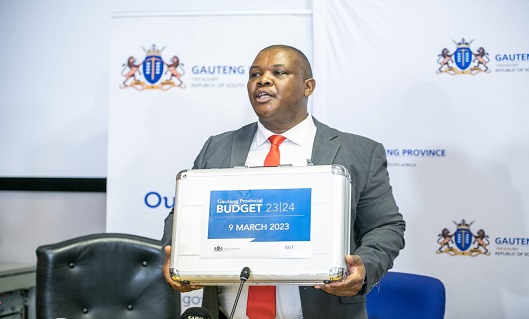Office of the Premier 2023/03/09 - 22:00

Thembisa Shologu
The Gauteng Provincial Government (GPG) has injected R493,4 billion over the Medium-Term Expenditure Framework (MTEF) into the province's economy.
The largest share will be injected to support social services, the township economy, job creation for youth, women empowerment and the energy crisis.
The 2023 MTEF Fiscal Framework will see the provincial budget grow by an annual average rate of 3%, from R158,945 billion in 2023/24 to R164,785 billion in 2024/25 and R169.703 billion in 2025/26 financial year.
Tabling the GPG budget for 2023/24 at the Provincial Legislature, MEC for Finance, Jacob Mamabolo said 83% of the provincial budget, amounting to R412 billion, over the 203 MTEF, is allocated to the Social Cluster.
"These resources will be used to drive social transformation in Gauteng and baselines of the departments," said MEC Mamabolo.
The economic cluster will receive R66.6 billion, or 13.5 per cent of the budget.
The governance cluster, which focuses on, amongst other things, strengthening collaboration amongst spheres of government, and enhancing integrated planning to improve service delivery, has been allocated R121 billion, or 23% of the 2023 MTEF budget.
Encouraged by the rebound in the economy to pre-COVID-19 levels, Mamabolo said the country's economy continues to recover even when faced with multiple risks like the deepening energy challenges.
The province's economic output is projected to moderate to 1.5% this year before stabilizing at an average annual rate of 2% in 2026.
"The GPG budget comprises transfers from the national government in Provincial Equitable Share, amounting to R148.2 billion in 2023/24, growing to R153,3 billion in 2024/25 and R160.2 billion in the outer year of the MTEF.
"Added to this money from the National Government in the form of Conditional Grants allocations, accounting for an average of 18% of total transfers, amounting to R27,4 Billion, R27.4 billion, R27,9 billion and R29.1 billion in each respective year of the 2023 MTEF, to realize policy imperatives within the education, health, human settlements and transport sectors," he said.
The province set its revenue collection target at R7.3 billion, and by the end of February, it had collected a total of 6.7 billion, representing 92% of the appropriated target.
Over the medium term, R24 billion is estimated to be collected.
"Our own revenue collection to date also reflects the recovery of the economy post-COVID-19 pandemic as observed in the collection of gambling and horse racing revenue.
"These estimates are mainly driven by growth in the new vehicle sales of 16.4% in the fourth quarter of 2022, of which a greater proportion is attributable to the province, according to the Statistics South Africa February 2023," said MEC Mamabolo.
About R4 billion additional allocation is for training and absorption of the 6000 crime prevention wardens currently undergoing training scheduled to conclude at the end of April.
Department of Community Safety has received about R4 billion as an additional budget allocation for training and absorption of the 6000 crime prevention wardens currently undergoing training scheduled to conclude at the end of April.
This is part of the government's move to fight against crime in the province, which remains its apex priority, including acquiring technological solutions to fight crime, such as drones and leasing helicopters to enhance the visibility of crime prevention efforts.
An amount of R7.68 has been set aside to improve the infrastructure within the Townships, Informal Settlements and Hostels (TISH).
Programmes in TISH areas are as follows; R3.5 billion towards the provision of new infrastructure, 3.8 billion for to improve basic infrastructure within informal settlements, and R322 million towards the renovation and improvement of conditions in hostels.
In the new financial year, the Gauteng Provincial Treasury will introduce pre-compliance checks before creating a Purchase Order for quotations between R500 000 to R1 million.
GPG will explore procurement rules allowing government and its main contractors to buy from large groups of township-based businesses, with systems linking them to supply as if they were one firm.
"This will build the needed capacity for these businesses to supply large markets and discover new suppliers. The GPG aims to spend 60% of the R35 billion budget for goods and services to support township initiatives," he said.
The province will establish an Invoicing Dispute Resolution Unit that will serve as an ombud for disputed invoices; a dedicated email has been established where all disputed invoices should be sent, disputedinvoices@gauteng.gov.za.
Meanwhile, regarding e-Tolls, Mamabolo said there is still work to be done to implement and fully give practical effects to this decision.
" It is in this context that we reported that a Memorandum of Agreement (MOU) will be concluded, and proper feedback update will be given in due course," Mamabolo added.
RELATED NEWS
No related news

